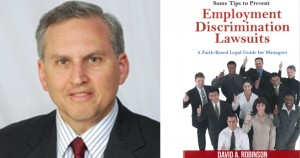By KAREN GRAVA
DIRECTOR OF MEDIA RELATIONS
A new book by David Robinson, a practitioner-in-residence in the College of Business and a labor lawyer, offers both managers and employees practical advice on avoiding discrimination lawsuits.

The book, Some Tips to Prevent Employment Discrimination Lawsuits: A Faith-Based Legal Guide for Managers, discusses the common types of discrimination in the workplace and offers advice to both the employer and the employee on how to avoid them.
The book uses religious sources to explain why discrimination is wrong. “The book shows how following religious and legal principles will help employers prevent discrimination in the workplace and reduce their exposure to employee lawsuits,” said Robinson, who practices law in the New Haven area and teaches management and labor law courses.
It also offers employees a way to determine whether or not their problems at work result from discrimination by their employer or from their own shortcomings. And that is important, Robinson says, because many employees who sue – rightly or wrongly – end up in a worse financial position than they were before the lawsuit was filed.
“Many of these people end up having trouble landing new jobs,” Robinson says. “Many employers don’t want to hire employees who have filed lawsuits. The employers don’t want to be next.”
Robinson took the faith-based route because he knew that readers might be bored with a recitation of the law. So he decided to incorporate quotations – and found many appropriate ones in the Bible. “I make the case that if an employer follows the Bible, he will also follow the law,” he says. “The laws against discrimination are based on biblical principles, and when both employers and employees follow these principles, discrimination in the workplace will be prevented.”
Topics covered by the book include discrimination on the basis of race, gender, sex, sexual orientation, religion and other topics. There is also information on preventing discriminatory language and tips on how to reduce damages and attorney fees.
“Discrimination is illegal, immoral and abusive and should end,” Robinson says. “The most important color in the workplace is not black or white. It is green. ‘Green’ can mean money, or it can mean environmentally friendly. Either way, ‘green’ is the most important color in the workplace. Your decisions should be based on the economic, and hopefully also the ecological, bottom line, not on an employee’s skin color, gender, age, ethnicity, or other discriminatory category.”










